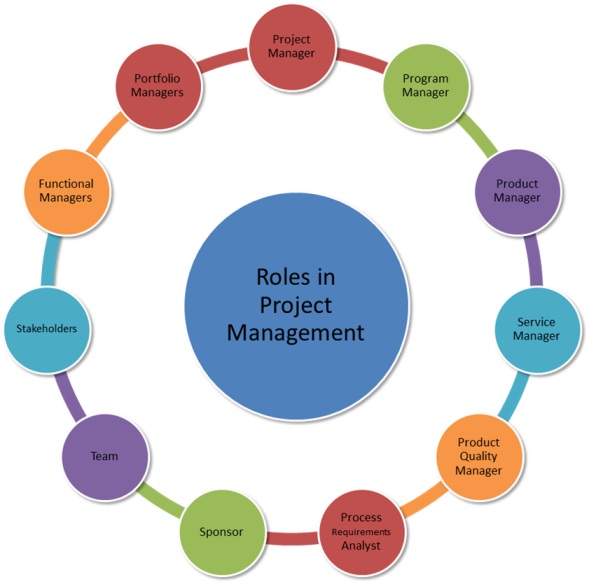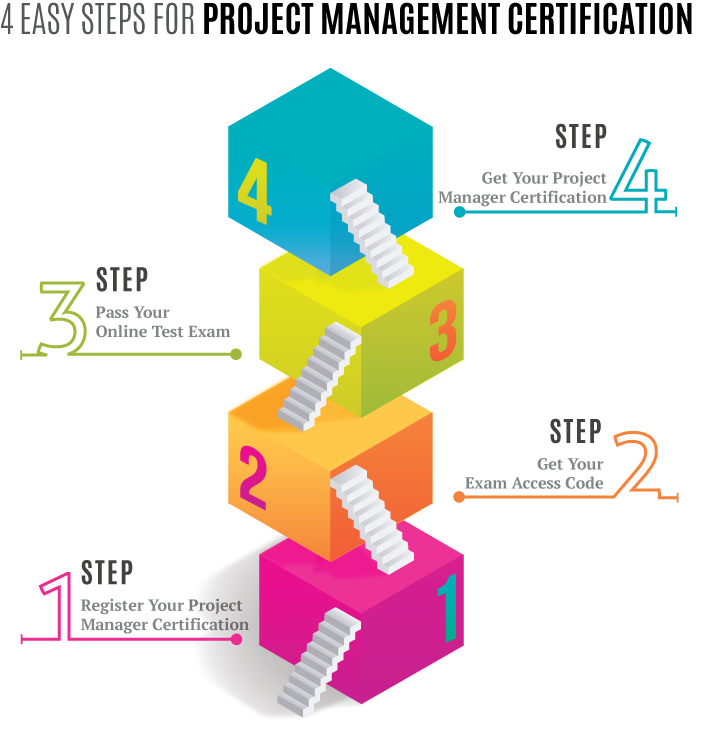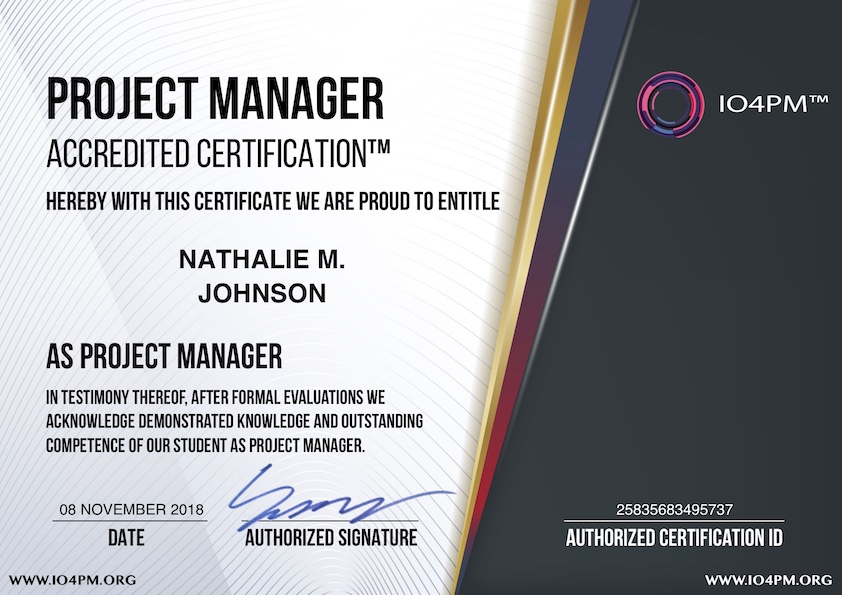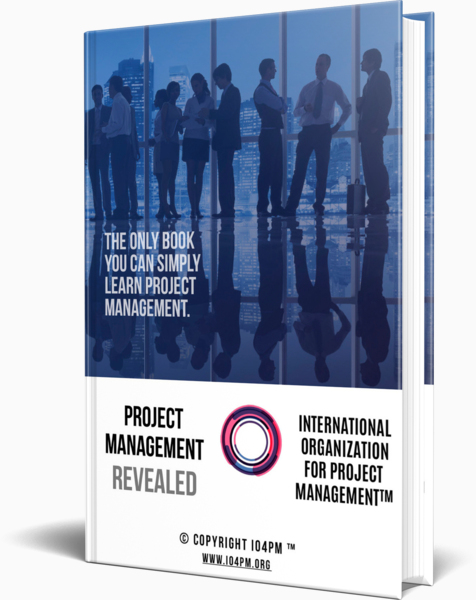Roles in Project Management
Project Management involves multiple individuals. Each individual plays a crucial role. Let’s look at the different roles involved in Project Management.

Roles in Project Management
ROLE OF A PROJECT MANAGER
The role of a project manager is to manage the entire project to meet its objectives.
The role may include:
- Assigned to the project no later than project initiating
- Helps write the project charter
- In charge of the project; not necessarily the resources
- Does not have to be a technical expert
- Influences the project team and the atmosphere in which the team works by promoting good communication, isolating the team from having to deal with politics, enhancing the positive aspects of cultural differences, and resolving team issues
- Ensures professional interaction between the project team members and other stakeholders
- Coordinates interactions between the project and key stakeholders
- Selects appropriate processes for the project
- Identifies and analyses constraints and assumptions
- Leads and directs project planning efforts
- Identifies dependencies between activities
- Must understand how to handle unrealistic schedule requirements to produce a realistic schedule
- Understands and enforces professional and social responsibility
- Identifies and delivers required levels of quality
- Assists the team and other stakeholders during project execution
- Defines the project change management plan
- Maintains control over the project by measuring performance and determining if there are any variances from the plan
- Determines the need for change requests, including recommended corrective and preventive actions and defect repair, and either approves or rejects changes as authorized or submits the change request to the change control board
- Uses metrics to see variances and trends in project work
- Works with team members to resolve variances from the project management plan
- Keeps the team members focused on risk management and possible responses to the risks
- Develops time and cost reserves for the project
- Must have the authority and accountability necessary to accomplish the project management work
- Must say “no” when necessary
- The only one who can integrate the project components into a cohesive whole that meets the customer’s needs
- Spends more time being proactive than dealing with problems (being reactive)
- Accountable for project success or failure
- Performs project closing at the end of each phase and for the project as a whole
- Performs or delegates most of the project management activities
- Overall, applies project management knowledge and uses personal and leadership skills to achieve project success
ROLE OF A PROGRAM MANAGER
The program manager is responsible for managing a group of related projects. Projects are combined into programs to provide coordinated control, support and guidance. The program works to meet project and program goals.
The role of the program manager may include:
- Managing related projects to achieve results not obtainable by managing each project separately
- Ensuring selected projects support the strategic goals of the organization
- Providing oversight to adjust projects for the program’s benefit
- Guiding and supporting individual project manager’s efforts
ROLE OF A PRODUCT MANAGER
This role is focused on strategic activities to deliver market requirements.
The role includes:
- Product Manager should be able to study the market needs and identify the current opportunities and threats based on these finding and observations
- He should be able to explore the opportunities and minimize the threats to make his organization successful
- For products which are already in the market, he should monitor their performance and also keep a close check on competitors’ products
- He should play an important role in launching a new product in the market as per the market study
- He should also be a sounding board for his operational team to stop production of any of its non-performing products
- Responsible to manage product’s performance in the market
ROLE OF A SERVICE MANAGER
A Service Manager is primarily responsible for managing service delivery for a given product or a service.
He/She is primarily involved in:
- Monitoring the overall performance of his Service area
- Identifying metrics for performance and tracking them
- Continue relationships with different teams including the Information Technology (IT) team, Business Partners and others
- Responsible to manage team’s performance in the service area
ROLE OF A PRODUCT QUALITY MANAGER
Product Quality Manager is primarily responsible for managing the product quality.
His role includes:
- Product Quality Manager has to identify the critical parameters/metrics that could fail the product when in use
- He is responsible to identify and implement audit mechanisms for these products. The audit mechanism can include total products to be sampled, the quality audit process, identification and selection of quality auditors, their training process, calibrating quality auditors, among others.
- Quality Audit Manager should also create a mechanism to track and monitor quality performance of the product
ROLE OF A PROCESS REQUIREMENTS ANALYST
The primary role of a process requirements analyst is to gather, analyze, document and validate the needs of the project through various stakeholders. The role encompasses working with the project or the product manager.
The role can be divided into:
- Identification of stakeholders: Stakeholders are any individual who is impacted by the process. They can be sponsor, management team, process owner, project manager, subordinates, analysts, users, among others. Project manager also plays a key role in identifying the stakeholders and the requirements analyst works with him for the identification.
- Defining Business Needs: The business needs can include business requirements, functional requirements, non-functional requirements, user requirements, information on size and complexity of the project, assumptions and constraints.
- Analyze Requirements: Analyze requirements include identifying the stated and un-stated needs of the customer. Conflicting and unambiguous requirements are identified and further clarified.
- Document Requirements: Documenting the requirements is another important role of a requirements analyst. The documentation has to be clear, concise, unambiguous and complete.
- Validate and Prioritize Requirements: This is an important role where the analyst reaches out to project stakeholders to validate the documented requirements. Validating requirements is further accompanied by prioritizing them.
ROLE OF A SPONSOR
The role of a sponsor prior to (or during) project initiation:
- Has requirements that must be met
- Is a project stakeholder
- Advocates for or champions the project, especially while the project concept is being put together
- Serves as a voice for the project or spokesperson to those who do not know about the project, including upper management
- Gathers the appropriate support for the project
- Ensures buy-in throughout the organization
- Provides funding
- Provides the project statement of work
- Provides information regarding initial scope of the project
- May dictate milestones, key events, or the project end date
- Determines the priorities between the constraints
- Provides information that helps develop the project charter
- Gives the project manager authority as outlined in the project charter
- Helps organize work into appropriate projects
- Sets priorities between projects
- Encourages the finalization of high-level requirements and scope by the stakeholders
- Guides the process to get the project approved and formalized, assisted by the project manager as necessary
The role of a sponsor during project planning:
- Provides the project team with time to plan
- May review the WBS
- Supplies list of risks
- Determines the reports needed by management to oversee the project
- Provides expert judgment
- Helps evaluate trade-offs during crashing, fast tracking, and reestimating
- Approve the final project management plan
The role of a sponsor during project execution, monitoring and controlling:
- Protects the project from outside influences and changes
- Enforces quality policies
- Provides expert judgment
- Helps evaluate trade-offs during difficult times, tracking, and reestimating
- Resolves conflicts that extend beyond the project manager’s control
- Approves or rejects changes or authorizes someone representing him or her to do so
- May direct that a quality assurance review is performed
- Clarifies scope questions
- Works with the project manager to monitor progress
The role of a sponsor during project closing:
- Provides formal acceptance of the deliverables
- Supports the collection of historical records from past projects
ROLE OF THE TEAM
The team is a group of people who will complete work on the project. The team may help to:
- Identify and involve stakeholders
- Identify requirements
- Identify constraints and assumptions
- Create the WBS
- Decompose work packages for which they are responsible into schedule activities
- Help identify dependencies between activities
- Provide time and cost estimates
- Participate in risk management process
- Comply with quality and communications plan
- Help enforce ground rules
- Execute the project management plan to accomplish work defined in the project scope statement
- Attend project team meetings
- Conduct process improvements
- Recommend changes to the project, including corrective actions
Some team members may have project management responsibilities in addition to their responsibilities of implementing work. If so, they are considered part of project management team.
ROLE OF STAKEHOLDERS AS A GROUP
The stakeholder is anyone who can positively or negatively influence the project, including the customers or users, the project manager and team, the project’s sponsor, program and portfolio managers, the PMO functional manager’s within the organization, and external sellers that provide services or materials for the project.
The stakeholders may be involved in:
- The creation of the project charter and the project scope statement
- Project management plan development
- Approving project changes and being on the change control board
- Identifying constraints
- Identifying requirements
- Risk management
The stakeholders may also become risk response owners.
ROLE OF A FUNCTIONAL MANAGER
A functional manager manages and owns the resources in a specific department, such as IT, engineering, public relations, or marketing, and generally directs the technical work of individuals from that functional area who are working on the project.
The degree to which a functional manager is involved in the project depends on the form of organizational structure:
In a matrix organization, the functional manager shares responsibility for directing the work of individuals with the project manager. In a project-centric organization, the project manager does all of the directing. In functional organization, the functional manager does all of the directing. It is the responsibility of the project manager to avoid any conflicts with the functional manager and coordinate the respective needs regarding the use of resources to complete the project work.
The activities of a function manager may include:
- Assign specific individuals to the team, and negotiate with the project manager regarding resources
- Let the project manager know of other projects that may impact the project
- Participate in the initial planning until work packages or activities are assigned
- Provide subject matter expertise
- Approve the final schedule during schedule development
- Approve the final project management plan during project management plan development
- Recommend changes to the project, including corrective actions
- Manage activities within their functional areas
- Assist with problems related to team member performance
- Improve staff utilization
ROLE OF A PORTFOLIO MANAGER
The portfolio manager is responsible for governance at an executive level of the projects or programs that make up a portfolio. A project is included in a portfolio based on the value of the project, the potential return on investment, whether it meets the corporate strategy, whether the level of risk associated with the project is acceptable, and other factors critical to organizational success.
The role of a portfolio manager may include:
- Managing various projects or programs that may be largely unrelated to each other
- Ensuring selected projects provide value to the organization
- Working with senior executives to gather support for individual projects
- Getting the best return from resources invested
 IO4PM™
IO4PM™



